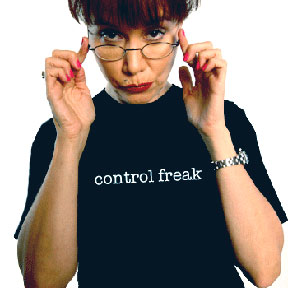 Most control freaks aren't aware (or won’t admit) they are, well control freaks. They fail to see how this type of behavior alienates others, and lessens their interest in working with them.
Most control freaks aren't aware (or won’t admit) they are, well control freaks. They fail to see how this type of behavior alienates others, and lessens their interest in working with them.
Dr. Shelley Prevost, co-founder of Lamp Post Group, a Chattanooga, Tennessee-based venture incubator, offers eight signs of controlling behavior in an article in Inc.
She contends control freak symptoms mask the true underlying condition in control freaks, “their own anxiety has run amuck.”
Instead of addressing our own patterns of irrational thinking, Dr. Prevost says, “We attempt to control the situation, usually by trying to control other people.”
Are You a Control Freak?
Are you wondering if you might be a control freak? See how many of the following behaviors ring a bell for you:
- If the other person would just agree to change a couple of things about themselves, it would make you happier. By frequently pointing out these “wrong” behaviors, you believe you are helping them to change.
- Others need to be micromanaged in order to fit your expectations (no matter how unrealistic they might be). You don’t settle for imperfection in yourself, so why should anyone else?
- You show your disapproval of another person’s behavior by passive-aggressively withholding attention until they “come around.”
- Your “constructive criticism” is really designed to promote your own agenda.
- You attempt to control how other people see you, by changing your actions or beliefs to fit the situation.
- You concoct worst-case scenarios in an effort to trigger fear, and manipulate the other person’s behavior.
- Ambiguous situations make you feel intensely uncomfortable.
- You believe you’re better equipped than the other person to explain their behavior to others.
A control freak is convinced that changing another individual’s behavior will make them feel more fulfilled. “You make someone else responsible for how you feel,” Dr. Prevost notes.
How to Break the Cycle
To break this self-defeating cycle, you have to understand “the road to better relationships always starts with you.” How can you create a 2.0 version of yourself?
- Never alter your core beliefs to make yourself more “likeable.”
- Be aware of your expectations of other people. Keep those expectations realistic, and appropriate.
- Don’t hide behind passive-aggressive behavior. Be honest and direct.
- Much of life is unknown and unpredictable. Deal with it.
- Sometimes confrontation is the only way to cope with a situation.
- You’re responsible for your own happiness.
“If you work on your own improvement instead of trying to control others,” Dr. Prevost notes, “healthier relationships at work, as well as everywhere else, will then come to you as a result.”
How do you cope with your own inner control freak?
Thanks to NLP Center for the image.
 Most control freaks aren't aware (or won’t admit) they are, well control freaks. They fail to see how this type of behavior alienates others, and lessens their interest in working with them.
Most control freaks aren't aware (or won’t admit) they are, well control freaks. They fail to see how this type of behavior alienates others, and lessens their interest in working with them.